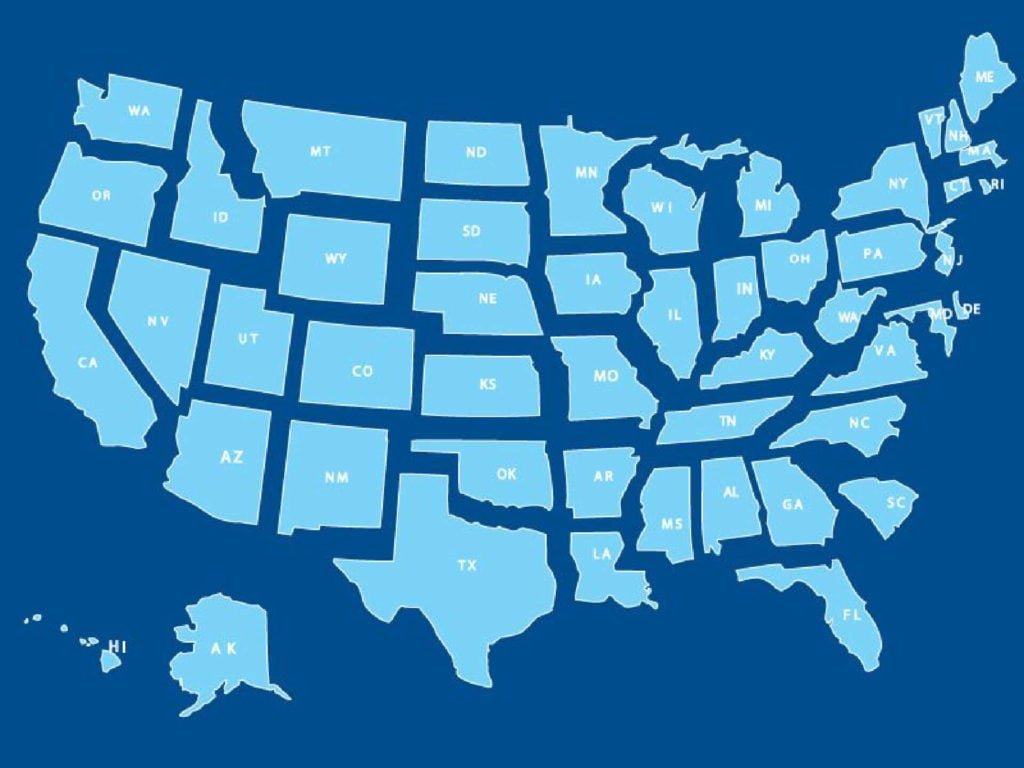Key Takeaways
- 24 states require employers to payout workers for accrued PTO
- 3 states prohibit employers from implementing a use-it-or-lose-it policy: Montana, Nebraska, and California
- PTO is not required by law. However, states that do offer PTO must follow certain guidelines. Check out our article on How to Create a PTO Policy for tips and strategies to creating the best policy for your business.
If you choose to offer your employees paid vacation leave as a benefit, understanding the various state-based PTO payout laws is essential to avoid being penalized or sued for wage violations.
In this article, we take a state-by-state look at the United States PTO payout laws. We also cover the classification of PTO, the availability of the “use it or lose it” policy, and PTO payouts.
What Are PTO Payouts?
Paid time off (PTO) is an employee benefit that allows employees to take time off work while still being paid. When an employee leaves an organization with unused accrued PTO, they may receive a PTO payout as part of their final wages instead.
PTO isn’t required by any state law. However, where an employer does offer it, there can be laws around the classification of PTO. This includes paid vacation time and what happens to earned unused vacation time when an employee leaves an organization.
For example, states may expressly allow or prohibit the use of the “use it or lose it” policy. This is a policy where employees forfeit their PTO balance and accrued vacation payout if they don’t use unused vacation time before a certain time, such as the end of the year or when they leave an organization. Where state law is silent on the issue, the employer can choose whether to incorporate it in their PTO policy.
Did You Know?
Connecteam’s time off management app allows you to manage all things PTO from your desktop, tablet, or phone. Employees can request time off directly from the app and you can track balances, create time off policies, and view all leave requests in a centralized location.
Get started with Connecteam for free today!

PTO Laws in Alabama
- There are no laws relating to vacation pay, the “use it or lose it policy,” or PTO payouts.
- If employers want to change their PTO policy, they must give employees advance notice. For example, employers can’t revoke accrued leave and accrued vacation payout under an existing PTO payout policy. The change can only apply to leave accrued in the future.
Read our full guide on Alabama state labor laws.
PTO Laws in Alaska
- There are no laws relating to vacation pay or the “use it or lose it policy.”
- Where a dispute arises around PTO payouts, the Department of Workforce Development applies an employer’s own internal rules and policies.
- If an employer fails to pay final wages—including earned leave under an employment contract—they will be liable to pay wages from the day the employee demands them until the day they are paid or 90 days of wages, whichever is the lesser amount.
PTO Laws in Arizona
- Where an organization has a PTO policy or practice, earned vacation time is considered wages.
- There are no laws relating to the “use it or lose it” policy.
- PTO and any payouts are determined by employers according to their policies and employment contracts. Employers must follow these.
- If employers fail to pay final wages, employees can sue for triple damages or file a wage claim with the Industrial Commission, up to $5,000.
Read our full guide on Arizona state labor laws.
PTO Laws in Arkansas
- There are no laws relating to vacation leave or the “use it or lose it” policy.
- Employees must be paid unused accrued vacation time when leaving an organization if this is set out in the employment agreement.
- If employers fail to make an agreed payout within 7 days of the next payday, employees are entitled to double the amount.
PTO Laws in California
- Earned vacation time is defined as wages.
- Employers are prohibited from applying a “use it or lose it” policy, but they can place a cap on vacation leave accruals.
- Unless a collective bargaining agreement states otherwise, employers must pay employees unused accrued vacation time when they leave the organization.
- If employers fail to do so, they may be liable for those wages plus up to 30 additional days of wages. If they wilfully fail to do so, they may also be liable for restitution.
Read our full guide on California state labor laws.
PTO Laws in Colorado
- Any vacation leave earned under an agreement between the employer and employee is considered wages or compensation.
- Employers can apply a “use it or lose it policy,” with certain conditions.
- Any vacation leave earned under an employment agreement must be paid out on an employee’s separation.
- Vacation leave must be paid out within 14 days of a written demand from an employee. Otherwise, the employer will be liable for double the amount owed or up to 10 days of the employee’s standard compensation—whichever is greater. Further penalties apply for intentional late payments.
Read our full guide on Colorado state labor laws.
PTO Laws in Connecticut
- Vacation leave is covered by the employment contract and is not considered wages.
- There are no laws relating to the “use it or lose it” policy.
- The employment contract determines whether departing employees are paid for unused earned vacation leave.
- Employers who fail to pay final wages may be liable for double the amount owed. They can also face additional fines and even imprisonment depending on the seriousness of the wage violation.
Try the #1 Time Off Management App.
Keep track of your employees’ time off, manage their schedules, and reduce payroll errors with Connecteam’s all-in-one app.
PTO Laws in Delaware
- Vacation leave is determined by the terms of the employment agreement.
- There are no laws relating to the “use it or lose it” policy.
- An employer must follow the terms of the employment agreement concerning paying out PTO on termination of employment. If the agreement is silent on the issue, then the employer does not have to pay.
- If an employer fails to pay out as obligated, they may be liable for liquidated damages equal to the unpaid hours or 10% per day until paid, whichever is less.
PTO Laws in the District of Columbia
- There are no laws relating to vacation pay or the “use it or lose it” policy.
- Employers must pay out unused vacation leave on termination if vacation leave is offered as part of the employee’s compensation package and there is no agreement otherwise.
- If not paid, the employer is liable for the unpaid wages plus 10% of the amount per day until paid.
PTO Laws in Florida
- There are no laws relating to vacation leave, the “use it or lose it” policy, or PTO payouts.
Read our full guide on Florida state labor laws.
PTO Laws in Georgia
- There are no laws relating to vacation leave, the “use it or lose it” policy, or PTO payouts.
Read our full guide on Georgia state labor laws.
PTO Laws in Hawaii
- There are no laws relating to vacation leave or the “use it or lose it” policy.
- PTO payouts are determined by the employment agreement or an employer’s uniform custom. If provided for, final wages must be paid on the last day of employment.
- Failure to pay can result in the employer being liable for unpaid wages. They may also face civil fines between $2,000 and $10,000, criminal fines between $100 and $10,000, and imprisonment for wage violations.
PTO Laws in Idaho
- There are no laws relating to the “use it or lose it” policy.
- Vacation leave—including PTO payouts—is governed by the employment contract or the employer’s policy.
- If an employer fails to pay unused vacation leave owed under an agreement, they can be liable for up to 15 days’ unpaid wages. The maximum amount payable will be $750, or $500 if paid before the employee files a lien.
PTO Laws in Illinois
- Earned vacation pay is considered final compensation.
- The “use it or lose it” policy is allowed, as long as the employer gives employees notice of the policy and a reasonable opportunity to take the vacation.
- An employer can decide whether employees can carry over days into the new year and can place caps on carryover days.
- If employers offer paid vacation leave, any unused accrued vacation pay must be included in employees’ final pay, unless there is a collective bargaining agreement to the contrary.
- Employers who fail to pay can be liable for damages of 2%, in addition to unpaid final compensation.
Read our full guide on Illinois state labor laws.
PTO Laws in Indiana
- If the employment contract sets out a formal vacation policy, vacation pay is considered deferred compensation in lieu of wages.
- The “use it or lose it” policy is allowed.
- Discharged employees must receive any unused earned vacation pay unless there is an agreement or policy explicitly limiting this.
- Failure to pay can result in an employer being liable for a 10% penalty per day, up to double the value of unpaid wages.
Read our full guide on Indiana state labor laws.
PTO Laws in Iowa
- Paid vacation leave is covered by an employment agreement or employer policy. Where it is offered, earned vacation leave is considered wages.
- There are no laws relating to the “use it or lose it” policy.
- PTO payouts are governed by the employment contract or employer’s policy or procedure.
- If an employer does not pay out as obligated, they may face fines of up to $500 per violation plus damages at 5% per day, if not paid within 7 days.
PTO Laws in Kansas
- While vacation leave is not mandatory, employers must provide a copy of their vacation leave policy on request.
- The “use it or lose it” policy is allowed.
- The employment agreement and employer’s policy govern vacation leave and associated PTO payout. An employer can set restrictions around the accumulation and payout of vacation leave.
- If an employer does not pay as required, they may be liable for a further 100% of the unpaid wages or 1% per day until paid, starting from the 9th day after payment is due, whichever is less.
PTO Laws in Kentucky
- Vacation leave is governed by the employment contract. Any “vested vacation pay” is considered wages.
- There are no laws relating to the “use it or lose it” policy.
- Any employer that offers vested vacation pay must pay a departing employee any unused portion of it. If the vacation leave has not been vested, the employer does not have to pay it.
- Failure to pay can result in civil penalties for the employer of between $100 and $1,000 per violation.
Read our full guide on Kentucky state labor laws.
PTO Laws in Louisiana
- The “use it or lose it” policy is allowed.
- An employer must pay a leaving employee any unused accrued vacation time if they are eligible to take it at the time they leave the organization.
- Failure to pay can result in liability for the full amount of unpaid final wages or 90 days of wages at the usual daily rate—whichever is less. They may also have to pay attorney’s fees.
PTO Laws in Maine
- The employment contract or employer’s policy and procedures determine vacation pay. If an employee is entitled to it, vacation pay is considered wages.
- The “use it or lose it” policy is allowed.
- Employers must pay out PTO where it’s provided for in the employment contract or employer’s policy and procedures.
PTO Laws in Maryland
- Where an employer offers paid vacation leave, they must follow the conditions set out in their policy or the employment contract.
- There are no laws relating to the “use it or lose it” policy.
- An employer must pay a departing employee any unused accrued vacation pay unless there is a written policy to the contrary. PTO is not payable if employees have advance notice that they lose any unused vacation pay.
- Failure to pay can result in fines between $100 and $500. Employees can also sue.
PTO Laws in Massachusetts
- Earned vacation leave is treated as wages.
- The “use it or lose it” policy is allowed but employees must be notified of it. The employer must also give them enough time to use their accrued vacation leave before the policy lapses.
- Any unused earned vacation leave must be paid to departing employees.
- Unpaid final pay can result in misdemeanor charges against an employer and fines of up to $1,000. Where wages were wilfully withheld, an employer may be liable for triple damages.
Read our full guide on Massachusetts state labor laws.
PTO Laws in Michigan
- Vacation pay is governed by the employment contract or employer’s policy. Where it is offered, vacation pay counts as a fringe benefit and not wages.
- There are no laws relating to the “use it or lose it” policy.
- Fringe benefits—including vacation pay—are to be paid on termination if provided for in the employment contract or employer’s policy. They can only be withheld if the employee agrees in writing.
- Failure to pay final wages makes an employer liable for restitution or a civil penalty of up to $7,000 for a first violation or otherwise $25,000, as well as criminal fines or imprisonment.
Read our full guide on Michigan state labor laws.
PTO Laws in Minnesota
- Vacation pay and any related payout when an employee leaves is a matter for the employment contract. Earned vacation pay is counted as wages.
- There are no laws relating to the “use it or lose it” policy.
- Failure to pay exposes an employer to civil penalties of 10% of the unpaid wages and damages of double the amount. Additional monetary penalties apply for blatant or repeated violations. An employer can also be charged with a misdemeanor.
Read our full guide on Minnesota state labor laws.
PTO Laws in Mississippi
- There are no laws relating to vacation pay or the “use it or lose it” policy.
- Payout of vacation leave upon an employee leaving is a matter governed by the employment contract.

PTO Laws in Missouri
- There are no laws relating to vacation pay or the “use it or lose it” policy.
- Final wages payable by law on separation do not include vacation pay.
Read our full guide on Missouri state labor laws.
PTO Laws in Montana
- Earned and accrued vacation pay under an employer’s policy are considered wages.
- The “use it or lose it” policy is prohibited. However, employers can put a cap on the amount of vacation leave an employee can earn.
- PTO payouts are owed according to an organization’s policy.
- If the employer does not pay out PTO where it is owed, they may be charged with a misdemeanor and can be penalized at 110% of the final wages.
PTO Laws in Nebraska
- Vacation pay is treated as a fringe benefit and, therefore, wages.
- The “use it or lose it” policy is prohibited.
- An employer must pay departing employees for any unused earned vacation leave.
- An employer can be sued if they fail to pay. They may be required to cover the final wages as well as attorney fees up to 25% of the final wages. In cases of wilful failure to pay, an employee can seek double the amount of unpaid wages.
PTO Laws in Nevada
- There are no laws relating to vacation pay or the “use it or lose it” policy.
- Vacation leave and associated payouts are covered by the employment contract. Employers are not required to pay out unused vacation leave, as long as their policy on this is consistent.
- Employers must offer any final pay per the terms of the employment contract or policy. If they do not, wages continue to accrue until paid or for 30 days, whichever is less. An employee can also sue.
Read our full guide on Nevada state labor laws.
PTO Laws in New Hampshire
- Earned vacation pay—if offered by employers—is a fringe benefit and treated as wages.
- The “use it or lose it” policy is allowed.
- PTO payouts are governed by the employer’s policy or employment contract. If these documents are silent on the issue, the employer is required to pay departing employees any unused earned vacation leave.
- Wilfully failing to pay can result in an employer being liable for the unpaid wages or 10% each day until it is paid, whichever is less.
PTO Laws in New Jersey
- Unused accrued vacation leave does not count as wages.
- There are no laws relating to the “use it or lose it” policy.
- PTO payouts are governed by the employment agreement, company policy, or union contract.
- Non-compliant employers can face administrative fees of between 10% and 25% of the final wages. They may also be subject to administrative penalties.
PTO Laws in New Mexico
- There are no laws relating to vacation or the “use it or lose it” policy.
- PTO payouts are governed by the employment contract or an employer’s policy.
- Where an employer fails to pay as required, they can be liable for up to 60 days’ wages. They can also be charged with a misdemeanor, fined up to $500, or imprisoned for up to 6 months.
PTO Laws in New York
- Vacation leave is governed by the employment contract or employer’s policy, which the employer must comply with.
- Employers can apply the “use it or lose it” policy, as long as they give employees advance notice of it.
- PTOs payouts are governed by the employment contract or employer’s policy. An employer can restrict PTO payouts, as long as they give employees sufficient notice.
- Employers who fail to pay out PTO where required can face civil penalties of up to $500. They may also be subject to criminal penalties such as fines ranging between $500 and $20,000 or imprisonment of up to one year.
Read our full guide on New York state labor laws.
PTO Laws in North Carolina
- Where an employer has a vacation leave policy, they must set out how employees earn vacation leave and when they can take it. The policy must include any carryover rules. It should also state the criteria whereby departing employees would forfeit their vacation leave. If the policy is silent on this last point, departing employees are entitled to a PTO payout.
- The “use it or lose it” policy is allowed. However, an employer must notify their employees in writing if the policy results in the loss or forfeiture of vacation leave.
- If an employer fails to pay final wages where required, they can be liable for the final wages, damages equal to the final wages, interest, and court costs.
Read our full guide on North Carolina state labor laws.
PTO Laws in North Dakota
- PTO—including vacation leave—comes under the definition of wages.
- The “use it or lose it” policy is allowed, as long as employees are given notice of it as well as the opportunity to take their leave
- Employers must pay employees any unused accrued paid time off upon the employee leaving.
- Private employers can withhold unused accrued PTO for employees who voluntarily leave the organization. However, this only applies if they gave the employee notice of this when they were hired, the employee has been with the organization for less than a year, and the employee gave less than 5 days’ notice.
- If they fail to pay, employers may be liable for the final wages, up to 30 additional days of wages, and interest. This liability increases for employers previously involved in wage claims.
Digitize Your Time Management and Eliminiate Payroll Errors
No more manual time sheets—Connecteam helps you manage your employees’ schedules and time off from a central platform.
PTO Laws in Ohio
- There are no laws relating to vacation leave or the “use it or lose it” policy.
- PTO payouts are governed by the employment contract or employer’s policy.
- Where an employer fails to pay final wages as required, they can be liable for the final wages, plus 6% or $200, whichever is greater.
Read our full guide on Ohio state labor laws.
PTO Laws in Oklahoma
- Wages include earned vacation pay, where it is offered.
- The “use it or lose it” policy is allowed.
- If an employer chooses to offer vacation pay, they must follow the rules set out in their policy or the employment contract. This includes any rules around PTO payouts, which are defined by the employer.
- If they fail to pay where required, an employer can face damages up to the amount of the final wages or 2% of the unpaid final wages per day, whichever is less.
PTO Laws in Oregon
- If an employer offers earned vacation leave, it is considered wages.
- There are no laws relating to the “use it or lose it” policy.
- Whether an employer pays out unused accrued vacation leave is determined by the employment contract, written policies, and past practices.
- Where an employer fails to pay as required, they may have to pay additional damages of up to 30 days’ wages.
Read our full guide on Oregon state labor laws.
PTO Laws in Pennsylvania
- If offered to employers, vacation pay is a fringe benefit and therefore considered wages.
- There are no laws relating to the “use it or lose it” policy.
- PTO payouts are determined by the employment contract or employer’s policy.
- Penalties for failing to pay include damages of up to 25% of the final wages or $500, whichever is greater. Employers may also face an additional penalty of 10% if they fail to pay or explain the situation to the Secretary of Labor within 10 days.
PTO Laws in Rhode Island
- After one year of service, earned vacation time is considered wages.
- There are no laws relating to the “use it or lose it” policy.
- Employers must pay any unused accrued vacation time on the separation of any employee who has been with the organization for at least one year.
- If they do not pay, an employer may be liable for unpaid wages plus double the amount in damages. They can also be charged with a misdemeanor and fined up to $400 or imprisoned. They may also be subject to an administrative fee of 25%-50% if unpaid wages are paid to the Department of Labor and Training.
PTO Laws in South Carolina
- Where it is offered, vacation pay is considered wages.
- There are no laws relating to the “use it or lose it” policy.
- The employment contract or employer’s policy determines whether a departing employee receives a PTO payout.
- Employers who fail to pay face civil penalties of up to $100 for each violation. Employees can also sue their employer for up to 3 times the amount of unpaid wages, as well as costs and attorney fees.
PTO Laws in South Dakota
- There are no laws relating to vacation pay or the “use it or lose it” policy.
- PTO payouts are not legally required.
PTO Laws in Tennessee
- There are no laws relating to the “use it or lose it” policy.
- The employment contract or employer’s policy sets out whether departing employees receive unused earned vacation pay.
- If an employer fails to pay, they can be charged with a misdemeanor and may face fines of between $100 and $500. If they have committed multiple violations, an employer could also face civil penalties of between $500 and $1,000.
Read our full guide on Tennessee state labor laws.
PTO Laws in Texas
- There are no laws relating to the “use it or lose it” policy.
- PTO payouts are determined by an employer’s policy or the employment contract.
- If an employer doesn’t comply with their policy or the contract in terms of PTO payouts, they can be liable for unpaid wages or a fine of $1,000, whichever is less.
Read our full guide on Texas state labor laws.
PTO Laws in Utah
- There are no laws relating to the “use it or lose it” policy.
- An employer must pay employees any unused earned vacation leave when they leave the organization unless the employer’s policy explicitly states otherwise.
- Employers who fail to pay within 24 hours can face liability for final wages, as well as up to 60 days of wages.
Read our full guide on Utah state labor laws.
PTO Laws in Vermont
- Employers who offer vacation pay must follow the rules set out in their employee handbook, employment contract, or other policy documents.
- There are no laws relating to the “use it or lose it” policy.
- PTO payouts are determined by the employer’s policy.
- Non-compliant employers can face fines of up to $5,000 and damages of double the amount of the final wages, as well as costs and legal fees.
PTO Laws in Virginia
- There are no laws relating to the “use it or lose it” policy.
- PTO payouts are determined by the employment contract or employer’s policy.
- If an employer fails to pay final wages where required, they can be liable for 8% interest from the date the wages were due on top of final wages. Intentionally not paying out PTO can lead to civil fines of $1,000. If done willfully and fraudulently, an employer can be convicted of a misdemeanor—for wages up to $9,999—or a felony—for wages of $10,000 or more.
Read our full guide on Virginia state labor laws.
PTO Laws in Washington
- Where an employer offers paid vacation leave, they must comply with the terms set out in the employment contract or their policy.
- There are no laws relating to the “use it or lose it” policy.
- PTO payouts for unused earned vacation leave depend on the employment contract or the employer’s policy.
- Where an employer fails to pay, they may be liable for 1% monthly interest in addition to final wages owed. Further monetary penalties can apply. Employers can also be charged with a misdemeanor.
Read our full guide on Washington state labor laws.
PTO Laws in West Virginia
- Accrued vacation pay is considered compensation for work performed.
- There are no laws relating to the “use it or lose it” policy.
- The employer does not need to pay if they have a written policy stating that accrued vacation won’t be paid when an employee leaves an organization
- Failure to pay where required could result in damages of double the amount in addition to the unpaid final wages.
PTO Laws in Wisconsin
- Earned holiday or vacation pay count as wage payments.
- There are no laws relating to the “use it or lose it” policy.
- An employer is not required to pay out unused accrued PTO to departing employees. However, if an employer’s vacation policy is silent on the issue, they must pay employees any unused accrued vacation leave.
- If the employer fails to pay as required, they can face a $500 fine or imprisonment and up to 100% of the unpaid amount in damages, on top of the unpaid amount.
Read our full guide on Wisconsin state labor laws.
PTO Laws in Wyoming
- Where an employer offers paid vacation leave, they must comply with the terms of their policy.
- There are no laws relating to the “use it or lose it” policy.
- Employers are required to pay unused accrued PTO according to their policy or the employment contract.
- Failure to do so could see the employer charged with a misdemeanor and facing fines of between $500 and $750. The employer is also liable for 18% interest on top of any unpaid final wages.
Which States Require PTO Payout?
- Alaska
- Arizona
- California
- District of Columbia
- Illinois
- Indiana
- Kentucky
- Louisiana
- Maine
- Maryland
- Massachusetts
- Minnesota
- Nebraska
- New Hampshire
- New York
- North Carolina
- North Dakota
- Ohio
- Oklahoma
- Pennsylvania
- Rhode Island (after one year of employment)
- Tennessee
- West Virginia
- Wyoming
FAQ
Can an employer take away earned vacation time?
PTO payout laws vary by state, so the answer to this question isn’t so clear-cut. For example, companies in states with use-it-or-lose-it policies are prohibited from paying out employees if they don’t use all their vacation time at the end of the year, or if they leave an organization with accrued PTO.
In some states, earned vacation time is defined as wages, and employers must pay employees if they do not use their PTO.
Is PTO required by law?
There are no federal or state laws that mandate PTO, however, most employers offer some form of PTO as an employee benefit.
What is a use-it-or-lose-it vacation policy?
States with use-it-or-lose-it policies prohibit employers from carrying over employee accrued PTO from one year to the next. Companies will set a specific date by which an employee must use their PTO, and if they don’t, the employee forfeits the vacation time.
States allow use-it-or-lose-it policies to benefit employers. These policies ensure that employees do not accrue large amounts of unused vacation time, which can lead to an increase in labor costs.
In these states, employees lose their vacation time and employers are not required to pay them out for these days.
Know Your PTO Payout Obligations To Avoid Penalties
The above provides a brief overview of PTO payout laws by state. However, employment laws change often and it’s essential you understand your obligations in detail to avoid any penalties. For this reason, you should speak to a lawyer about the PTO payout obligations in your state when designing your PTO policy.
*This article is for informational purposes only and is not intended as legal advice.
To learn more, check out our article: The Manager’s Guide to Time-Off Requests.




